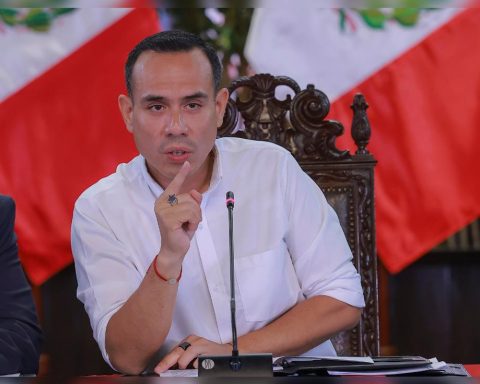Bitcoin, the digital exchange currency created in 2009, which was adopted as Legal currency of El Salvadorr 4 months ago, could present serious risks to the country Central American or his possible followers.
The warning is from International Monetary Fund (IMF)an international organization that has guaranteed the stability of the international monetary system for almost 80 years.
“The adoption of a cryptocurrency as legal tender poses serious risks to market and financial integrity, financial stability and consumer protection and may result in contingent tax liabilities.”, the agency specified in a statement.
In another document, the Basel (Switzerland) Banking Supervision Committee, made up of the regulators of the world’s main financial centers and whose function is to strengthen the soundness of financial systems, warned that, if stricter capital requirements are not introduced, continued growth of cryptocurrencies could increase risks to global financial stability for “fraud, cyberattacks, money laundering, and financing of terrorism,” among other things.
In addition, the Executive Board of the IMF asked the Salvadoran government “to reduce the scope of the Bitcoin Law, eliminating its status as current legal currency.”
The main point of this law is the regulation of bitcoin as legal tender with unlimited liberating power for any type of transaction carried out by natural, legal, public or private persons. The virtual currency entered under the same conditions as the dollar, adopted as the official currency of El Salvador more than two decades ago.
The IMF also warned that the adoption of bitcoin “raises a series of macroeconomic, financial and legal issues that require very careful analysis”, according to Gerry Rice, a spokesman for the entity, at a press conference.
Likewise, he pointed out that El Salvador would have to reassess some of its economic policies to reach an agreement with the IMF on a financial assistance program for the economic crisis caused by the pandemic.
Nayib Bukele, the president of El Salvador gave little importance to the IMF’s approaches and responded with a message on Twitter: “I see you, IMF thats very nice”, or “I see, IMF. That’s very nice.”
El Salvador became the first country in the world to adopt a cryptocurrency as legal tender in early September 2021 because President Bukele decided to do so to facilitate the sending of remittances to the country by Salvadorans residing abroad.
NERVOUSNESS
The announcement produced reactions and warnings worldwide and fears that the measure could cause not only more instability and inflation in El Salvador but also globally, if the adoption of cryptocurrencies grows.
foreign investors they are nervous and fear that the adoption of Bitcoin will hinder an agreement between El Salvador and the IMF for US$1,000 million. But the IMF has said that the dialogue between the parties remains open.
However, analysts insist on remembering that since November, Bitcoin has lost more or less half of its value.
Since last September, specialists from around the world have been studying financial formulas not only to deal with El Salvador’s monetary decision, but also to shield themselves from eventual supporters.
Global regulators have proposed to banks around the world that they set aside enough capital to cover the losses of any bitcoin holding in full.
The Basel Committee on Banking Supervision (Switzerland) raised a two-pronged approach to capital requirements for cryptocurrency assets in banks.
The world’s largest economies, including China and the United States, are now considering stricter rules and analyzing how to develop their own digital currencies, according to experts.
It is estimated that worldwide Bitcoin and other cryptocurrencies would have a value of about US $ 1,600 million, a small amount, compared to banking trends of loans, derivatives and other important assets, according to the Reuters agency.
Bitcoin (BTC) differs from other currencies in whate is not regulated by any government or issuing bank (decentralized) and for using Blockchain technology in its infrastructure and security.
Virtual currency offers users not only complete anonymity, but also the possibility of obtaining lower transaction fees, compared to traditional payment mechanisms involving banks.
Colombia is one of the countries where cryptocurrencies are most traded. It is estimated that there are about 690 sites where you can pay, especially with Bitcoin, products and services.
It is unofficially estimated that investments in cryptocurrencies exceeded $US150 million last year.
GLORY HELENA KING
BRIEFCASE

















